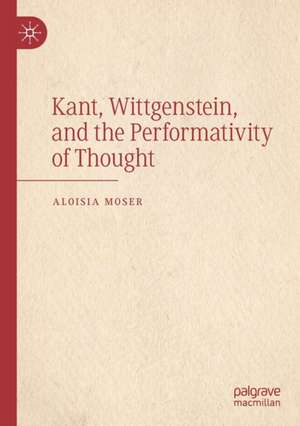Kant, Wittgenstein, and the Performativity of Thought
Autor Aloisia Moseren Limba Engleză Paperback – 20 aug 2022
Aloisia Moser argues that Kant speaks about acts of the mind, not about static categories. Furthermore, she elucidates the Tractatus’ logical form as a projection method that turns into a so-called ‘zero method’, whereby propositions are merely the scaffolding of the world. In so doing, Moser connects Kantian reflective judgment to Wittgensteinian rule-following. She thereby presents an account of performativity centering neither on theories nor methods, but on the application enacting them in the first place.
| Toate formatele și edițiile | Preț | Express |
|---|---|---|
| Paperback (1) | 576.74 lei 6-8 săpt. | |
| Springer International Publishing – 20 aug 2022 | 576.74 lei 6-8 săpt. | |
| Hardback (1) | 638.46 lei 6-8 săpt. | |
| Springer International Publishing – 19 aug 2021 | 638.46 lei 6-8 săpt. |
Preț: 576.74 lei
Preț vechi: 678.52 lei
-15% Nou
Puncte Express: 865
Preț estimativ în valută:
110.37€ • 114.53$ • 92.25£
110.37€ • 114.53$ • 92.25£
Carte tipărită la comandă
Livrare economică 17-31 martie
Preluare comenzi: 021 569.72.76
Specificații
ISBN-13: 9783030775520
ISBN-10: 3030775526
Pagini: 158
Ilustrații: XV, 158 p.
Dimensiuni: 148 x 210 mm
Greutate: 0.22 kg
Ediția:1st ed. 2021
Editura: Springer International Publishing
Colecția Palgrave Macmillan
Locul publicării:Cham, Switzerland
ISBN-10: 3030775526
Pagini: 158
Ilustrații: XV, 158 p.
Dimensiuni: 148 x 210 mm
Greutate: 0.22 kg
Ediția:1st ed. 2021
Editura: Springer International Publishing
Colecția Palgrave Macmillan
Locul publicării:Cham, Switzerland
Cuprins
1. Introduction: Kant’s Acts of the Mind and Wittgenstein’s Projection Method.- Part I Kant and the “I Think” as the Facticity of Thought.- 2.A Connection Between Thought and Thing A Priori.- 3. Judging as Connecting Thought and Thing.- 4. Synthesis and Bringing the Manifold of Intuition into an Image.- Part II Wittgenstein’s Picture Theory as a Method of Projection.- 5. The Form of the Proposition.- 6. Projection Method.- 7. Logic Degree Zero.- Part III Kant’s Schematizing and Wittgenstein’s Picturing or Projecting as Performativity.- 8. Kant, Synthesis, and Schema.- 9. Wittgenstein, Meaning, and Use.- 10. Performativity and the Act of Thinking.- 11. Conclusion.
Notă biografică
Aloisia Moser is Assistant Professor in the Department of the History of Philosophy at the Catholic Private University in Linz, Austria
Textul de pe ultima copertă
This book explores the idea that there is a certain performativity of thought connecting Kant’s Critique of Pure Reason and Wittgenstein’s Tractatus Logico-Philosophicus. On this view, we make judgments and use propositions because we presuppose that our thinking is about something, and that our propositions have sense. Kant’s requirement of an a priori connection between intuitions and concepts is akin to Wittgenstein’s idea of the general propositional form as sharing a form with the world.
Aloisia Moser argues that Kant speaks about acts of the mind, not about static categories. Furthermore, she elucidates the Tractatus’ logical form as a projection method that turns into a so-called ‘zero method’, whereby propositions are merely the scaffolding of the world. In so doing, Moser connects Kantian reflective judgment to Wittgensteinian rule-following. She thereby presents an account of performativity centering neither on theories nor methods, but on the application enacting them in the first place.
Aloisia Moser is Assistant Professor in the Department of the History of Philosophy at the Catholic Private University in Linz, Austria.
Aloisia Moser argues that Kant speaks about acts of the mind, not about static categories. Furthermore, she elucidates the Tractatus’ logical form as a projection method that turns into a so-called ‘zero method’, whereby propositions are merely the scaffolding of the world. In so doing, Moser connects Kantian reflective judgment to Wittgensteinian rule-following. She thereby presents an account of performativity centering neither on theories nor methods, but on the application enacting them in the first place.
Aloisia Moser is Assistant Professor in the Department of the History of Philosophy at the Catholic Private University in Linz, Austria.
Caracteristici
Develops a theory of the act of thinking through readings of Kant and early Wittgenstein Reveals that both Kant and Wittgenstein invite (even require) a core understanding of the performativity of thought Relates Kant’s views on the connection of intuitions and concepts to Wittgenstein’s idea of general propositional form as sharing a form with the world
